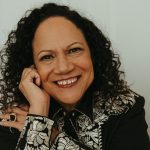Suzy Bogguss makes it look easy. After 25 years in the business and more awards than you can shake a stick at, you’d expect that. But watching her on stage you get the feeling she was born for this and feels most comfortable in front of an audience. She was loose, smiling constantly. With the excellent Charlie Chadwick on (the amazing folding) bass and Craig Smith on guitar (from Texas via Scotland), the trio laid down some gorgeous harmonies.
This night at the Red Clay Music Foundry marked a narrative arc in her career: Her 1989 debut, Somewhere Between, features the eponymous opener written by Merle Haggard, and her latest, Lucky, is an entire album of Haggard songs. At its heart, the album is a showcase for Bogguss’ talent at transforming other songwriters’ work into her own, infusing the songs with her own crystalline vocal style, revealing the universal appeal and beauty of Haggard’s songwriting. Smith’s nimble Telecaster solos added the perfect twang.
In two loose and flowing sets, she covered early hits like Nanci Griffith’s “Outbound Plane,” and John Hiatt’s “Drive South” as well as Haggard classics “Today I Started Loving You Again” and “Let’s Chase Each Other Around the Room.”
As always during any show at Eddie Owens’ gorgeous listening room, a freight train rumbled by causing Bogguss to pause with a delighted gasp and then break into a few bars of “City of New Orleans.”
She spoke of her midwestern roots growing up in Moline, Illinois — just seven miles from the Mississippi River – and later of a whirlwind tour with Garrison Keillor that prompted her to record her 2011 album American Folk Songbook, traditionals arranged by Bogguss. Her vocal range is such that she can belt out a good country song, dip easily into lilting folk classics like “Shenandoah” and “Wafaring Stranger” and then offer up the saucy jazz strut of Matraca Berg’s “Eat at Joe’s.”
Encores included the yodel-filled swing of a Patsy Montana classic “I Want to Be a Cowboy’s Sweetheart” before the trio went off mic for such a stirring version of “Red River Valley” you could almost feel the ghost of Tom Jode lurking in the dark. This was country music at its best: melancholy tunes, double entendres, and songs about real people dealing with grown-up problems.




